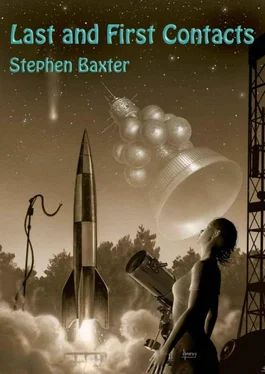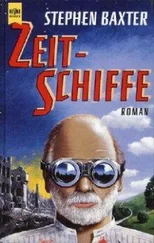Stephen Baxter - Last and First Contacts
Здесь есть возможность читать онлайн «Stephen Baxter - Last and First Contacts» весь текст электронной книги совершенно бесплатно (целиком полную версию без сокращений). В некоторых случаях можно слушать аудио, скачать через торрент в формате fb2 и присутствует краткое содержание. Город: London, Год выпуска: 2012, ISBN: 2012, Издательство: NewCon Press, Жанр: Фантастика и фэнтези, на английском языке. Описание произведения, (предисловие) а так же отзывы посетителей доступны на портале библиотеки ЛибКат.
- Название:Last and First Contacts
- Автор:
- Издательство:NewCon Press
- Жанр:
- Год:2012
- Город:London
- ISBN:978-1-907069-40-6
- Рейтинг книги:5 / 5. Голосов: 1
-
Избранное:Добавить в избранное
- Отзывы:
-
Ваша оценка:
- 100
- 1
- 2
- 3
- 4
- 5
Last and First Contacts: краткое содержание, описание и аннотация
Предлагаем к чтению аннотацию, описание, краткое содержание или предисловие (зависит от того, что написал сам автор книги «Last and First Contacts»). Если вы не нашли необходимую информацию о книге — напишите в комментариях, мы постараемся отыскать её.
Last and First Contacts
Last and First Contacts — читать онлайн бесплатно полную книгу (весь текст) целиком
Ниже представлен текст книги, разбитый по страницам. Система сохранения места последней прочитанной страницы, позволяет с удобством читать онлайн бесплатно книгу «Last and First Contacts», без необходимости каждый раз заново искать на чём Вы остановились. Поставьте закладку, и сможете в любой момент перейти на страницу, на которой закончили чтение.
Интервал:
Закладка:
I went to my cabin, and threw up all I had eaten.
The fourth day of our journey was dull by comparison. We sat on the bridge, chewing on half-cooked TV dinners, watching the show.
We were sinking into a deep future of possible cosmic outcomes. We now seemed to be faced by a set of models of the dark energy in which its density remained constant, neither growing nor falling. According to Elstead, all we could do was wait; even at the gathering rate of our descent, there were many slow processes to be worked out before the cosmos came to its next decision point.
Thus we reached a time, a hundred billion years deep, when the cosmic expansion carried other galaxies ‘beyond our cosmological horizon’, as Junge put it, their light no longer able to reach us. Our elliptical galaxy was left alone, hanging in space like a single candle in a cathedral.
It was an increasingly shabby galaxy at that. The galaxies’ merger had wasted much of the material needed to make new stars. In time, all that was left was a population of small, miserly stars, eking out their paltry stores of hydrogen. Even they were dying, of course.
I wondered about life. ‘Civilisations like our own could be rising and falling all around us and we’d never see them.’ It was true; we rushed by too quickly.
Elstead picked on that. ‘If there is life out there, do you imagine there could still be people? Even if humanity survives, could our descendants still be anything like us?’ He glanced at my crucifix, which floated in the air before my throat. ‘Are you a practicing Christian, Susie?’
‘Sort of.’ I was brought up Catholic; I attended Mass with my parents. I welcomed the social glue of the Church, and I liked to think I had an open mind about the rest. ‘You?’
He snorted. ‘No, but my parents were, as you can tell from my first name. Consider this. In our day Christianity was only, only , a couple of thousands of years old. Some gods have been around longer – but many more have been forgotten. We have no idea to what gods Stonehenge was dedicated, for example. Human culture seems incapable of keeping its gods alive for more than a few millennia.
‘But suppose humanity survives a million years – or ten million. Most mammalian species go extinct on such timescales. How will time change mankind? Is it even conceivable that the memory of any god could survive such a stupendous interval? Because that’s what you have to believe, you see, if you follow Christ, or Allah, a One True God.’
I thought about that. ‘Either possibility – the abandonment of Christianity, or its enduring for a million years – is hard to get my head around.’
‘Yes, it is. But go even further. What happens if humanity goes extinct? Could the last man baptise an octopoid creature from Alpha Centauri? Can the flame be kept alive in alien heads? And what happens if intelligence fails altogether? Is there room for Christ in a universe altogether without mind, even without life? Because that is what you must believe. Or if you can’t believe it, then what is the purpose of your faith?…’
He went on in this hectoring way for some time. Junge shot me sympathetic glances, but I wasn’t troubled; my residual faith isn’t deep enough for that.
Anyhow I understood that Elstead was just picking on me because he was bored by this long day – bored, as he waited for the end of the universe.
On the fifth day the stars went out.
For a while the sky was full of their remains. There were black holes and neutron stars, the remnants of giants, while stars like our sun became white dwarfs, slowly fading to black. Occasionally a flare would light up the dark, as an unlucky dead star fell into a black hole, or dwarfs collided and ignited. But these were rare, chance events. Junge said that in the end our sun would collapse to a single, immense crystal of carbon, a diamond cool enough to touch. It was a wonderful image, but we weren’t able to see it.
On the sixth day we watched the galaxy disintegrate. Chance encounters threw one star after another out of the galaxy’s gravity well, a relentless evaporation that turned our black sky even blacker. Junge said that the galaxy was dispersed utterly after some hundred billion billion years.
That long day I spent some time trying to make such numbers meaningful. Such was the expansion of scales that as a single year was to the lifetime of the universe in my day, so the entire epoch from Big Bang to humans was to this new age. But any such comparisons, fleetingly grasped, were soon overwhelmed by our continued plummeting into ever more outlandish depths of time.
And still the expansion continued, still the universe’s dreary physical processes unfolded. There was no sound in the Bathyscaphe but our own breathing and the whir of the air scrubbers.
On the seventh day the ghosts of the last stars, mere infra-red traces, faded out one by one. The cosmic expansion, having long ago separated galaxies from each other, now plunged its hands deep into stellar neighbourhoods. There came a point when the remnant of the sun was left isolated within its cosmological horizon: the sun, alone in its own universe.
And as the day wore on, even the diamond sun began to break up.
Junge had a set of particle detectors mounted on the hull of the Bathyscaphe. He passed their signals through a speaker, and we heard soft pings from the cosmic dark.
‘Protons,’ Elstead breathed. ‘The decay of protons into their constituent quarks – on the very longest of terms, even solid matter is unstable. Another theory vindicated! They ought to give me the Nobel Prize for this.’
‘So what happens now?’
‘That all depends, Susie. On what we find tomorrow.’
None of us went to bed that night. We brought blankets from the cabins and sat in our couches, side by side, the only light in the universe shining on our faces. Nobody slept, I don’t think. Yet nobody had the nerve to suggest that we shut off the softscreens and exclude that terrible, unending night. I watched the clock. There wasn’t anything else to do.
At last, the eighth day began.
At the time we understood nothing of what happened to us. Later we reconstructed it as best we could.
We stayed together that night because we thought we were alone in the universe. We were wrong. Humans had never been alone.
From a hundred centres, life and mind spread across the face of the Galaxy. Gaudy empires sprawled; hideous wars were fought; glittering civilisations rose and fell. Yet what survived each fire was stronger than what had gone before.
Humanity, born early, did not survive to participate in this adventure. But the wreckage of Earth was discovered; humans were remembered.
Then came the collision with Andromeda, a ship of stars carrying its own freight of history and civilisation. The vast disruption inflicted deep wounds on two galactic cultures – wounds made worse by the wars of the dark days that followed.
Yet out of these conflicts came a new mixing. Minds rose up from the swarming stars like birds from a shaken tree, and then flocked into a culture stronger and more brilliant than those which had preceded it – but a more sober one.
In the long ages that followed, civilisation turned from conquest to consolidation, from acquisition to preservation. Vast libraries were constructed, and knowledge was guarded fiercely.
But the universe wound down.
As the galaxy evaporated, its unified culture disintegrated into fiefdoms. Worse, as the stars receded from each other, the universe shed its complexity, and it became impossible for the ancient catalogues to be maintained. Information was lost, whole histories deleted.
Nobody even noticed when the last traces of humanity were expunged.
Читать дальшеИнтервал:
Закладка:
Похожие книги на «Last and First Contacts»
Представляем Вашему вниманию похожие книги на «Last and First Contacts» списком для выбора. Мы отобрали схожую по названию и смыслу литературу в надежде предоставить читателям больше вариантов отыскать новые, интересные, ещё непрочитанные произведения.
Обсуждение, отзывы о книге «Last and First Contacts» и просто собственные мнения читателей. Оставьте ваши комментарии, напишите, что Вы думаете о произведении, его смысле или главных героях. Укажите что конкретно понравилось, а что нет, и почему Вы так считаете.












